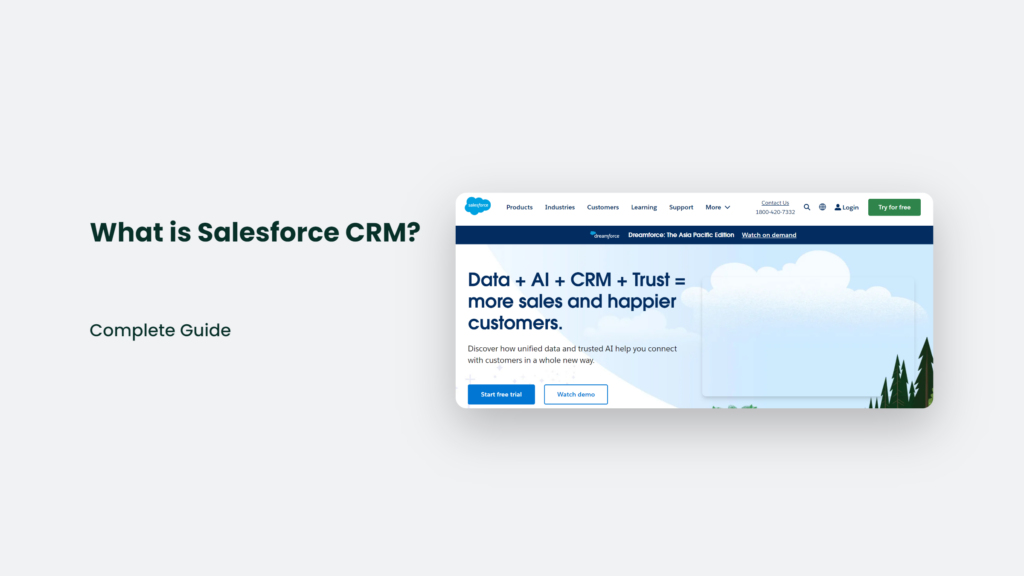

What is Salesforce CRM?

As Seen On
CRM stands for Customer Relationship Management. As far as buzzwords go, it’s about as dry as they come. But CRM software like Salesforce is a big freaking deal in the business world. Here’s why.
Imagine you meet someone at a party. The next day, they remember your name, where you’re from, what you do for work, and that hilarious story you told about your dog eating your paycheck. You’d be impressed, right? That’s what CRM does for businesses trying to build relationships with customers.
Businesses today are like the creepy dude at the party who calls you “baby” and doesn’t listen when you talk. They spam your inbox, stalk you with ads, and ask for your number but never call you back. CRM is like a digital memory pill that helps sales and marketing people remember what their customers and leads care about, so they can not be that guy.

Here are a few ways CRM helps businesses stop ghosting their customers and start building real relationships:
It Records Your Sales Conversations
Ever talked to a salesperson who repeats the same 5 questions every time you chat? It’s like Groundhog Day. CRM software captures details from each conversation so your salespeople always remember what you discussed. No more awkward small talk about the weather.
It Tracks Your Website Activity
You know when you visit a store’s website and then see ads stalking you around the internet? CRM software does the same thing (sorry, not sorry). It captures visitors’ views on your site so you can follow up with relevant offers.
It Manages Your Contacts
No more scribbling customer’s names and numbers on napkins and losing them in the wash. CRM software keeps all your lead and customer contact details organized. Plus, it integrates with email, so you can connect from right inside your inbox.
It Automates Follow-Ups
You don’t have to remember to call someone back in a week manually. CRM platforms let you set tasks, reminders, and automatic follow-up emails based on each lead’s interactions and preferences. No more ghosting!
What is Salesforce CRM: A Brief History of Salesforce
Back in the 90s, most CRM software sucked. Salespeople saw clunky desktop software as a chore, not a helper. A former Oracle executive, Marc Benioff, saw an opportunity to make CRM people actually want to use.
In 1999, he launched Salesforce as the first web-based CRM. It provided an intuitive interface and tools that sales teams got excited about. Plus, it is integrated with email and other apps that salespeople use daily.
Over the past 20+ years, Salesforce has expanded into a massive cloud-based software empire. Their CRM platform evolved into a full customer management and analytics solution called Salesforce 360. It provides marketing, sales, service, and other departments with a single view of each customer.
Salesforce also acquired or built tools for:
- Collaboration (Slack)
- Data visualization (Tableau)
- Marketing automation (Pardot)
- Commerce (Demandware)
Today, 150,000+ companies use Salesforce products to manage their business processes. Their software is like a Swiss army knife tailored for customer-obsessed teams.
Salesforce CRM Features
Salesforce 360 has morphed into a beast of a platform. Here are some of the key features that help marketing and sales pros stay on their A-game.
Contact Management
- A unified database of all your leads and customers
- Track contact details, demographic info, social profiles, and more
- Activity timeline shows interactions across channels
Workflow Automation
- Set up business processes to trigger actions
- Assign leads and tasks automatically based on behaviours
- Send drip email campaigns and follow-ups
Sales Tools
- Manage opportunities and pipeline
- Log calls and meetings automatically
- Sync calendars and view colleague availability
- Access customer data from anywhere
Marketing Tools
- Send targeted emails and campaigns
- Create landing pages and forms
- Score and segment leads based on behaviors
- Track campaign results and ROI
Analytics
- Create reports and dashboards
- Gain insights into performance
- Identify trends and optimization opportunities
- Predict outcomes with AI
App Integration
- Connect email, e-commerce, and other apps
- Unify data into a single view
- No more switching between programs
- Build custom apps and components
Chatter
- A Facebook-like newsfeed for company updates
- Share posts, files, and knowledge
- Message colleagues
- Create groups and track projects
And much more! Salesforce offers different editions with varying features based on your business needs and budget.
Is Salesforce the Right CRM for You?
Salesforce is the 800-pound gorilla in the industry. But there are better fits for some businesses.
Consider Salesforce if:
- You’re a medium or large company that needs scalable, enterprise-level software
- You want an established provider with a large ecosystem
- Your teams use Salesforce’s other products like Slack or Tableau
- You need complex sales, marketing, and analytics capabilities
You may want to look at other CRM options if:
- You’re a small business or an early-stage startup
- You want simple contact management, not a complex platform
- You don’t need advanced sales automation and analytics
- Your budget is limited
Competitors like HubSpot, Zoho, and Freshworks offer more affordable CRM solutions for early-stage companies. Salesforce is the gold standard for enterprise CRM but comes with more complexity and a bigger price tag.
CRM is Not a Silver Bullet
Here’s the thing – CRM software alone isn’t going to magically fix your business. You can have the most advanced tech in the world and still provide a lame customer experience if you don’t have the right strategy, people, and processes.CRM is just a tool. To build great relationships, you need to:
Map out ideal customer journeys and experiences
- Equip staff with training and guidelines
- Set up processes to engage customers based on behaviours
- Hire people who are passionate about customer success
- Foster a culture focused on the customer, not sales quotas
- Use data and feedback to continuously improve
- Build trust by providing value, not just promotions
Nailing the basics will get you further than any software. However, a great CRM can help skilled teams execute and scale personalized engagement.
So don’t believe the hype that AI and automation will fix a crappy customer experience. But don’t leave your sales and marketing people flying blind without a CRM, either. Find the right balance of strategy, technology, and talented humans to guide prospects into happy, loyal customers.
Konger
Up until working with Casey, we had only had poor to mediocre experiences outsourcing work to agencies. Casey & the team at CJ&CO are the exception to the rule.
Communication was beyond great, his understanding of our vision was phenomenal, and instead of needing babysitting like the other agencies we worked with, he was not only completely dependable but also gave us sound suggestions on how to get better results, at the risk of us not needing him for the initial job we requested (absolute gem).
This has truly been the first time we worked with someone outside of our business that quickly grasped our vision, and that I could completely forget about and would still deliver above expectations.
I honestly can't wait to work in many more projects together!
Disclaimer
*The information this blog provides is for general informational purposes only and is not intended as financial or professional advice. The information may not reflect current developments and may be changed or updated without notice. Any opinions expressed on this blog are the author’s own and do not necessarily reflect the views of the author’s employer or any other organization. You should not act or rely on any information contained in this blog without first seeking the advice of a professional. No representation or warranty, express or implied, is made as to the accuracy or completeness of the information contained in this blog. The author and affiliated parties assume no liability for any errors or omissions.

